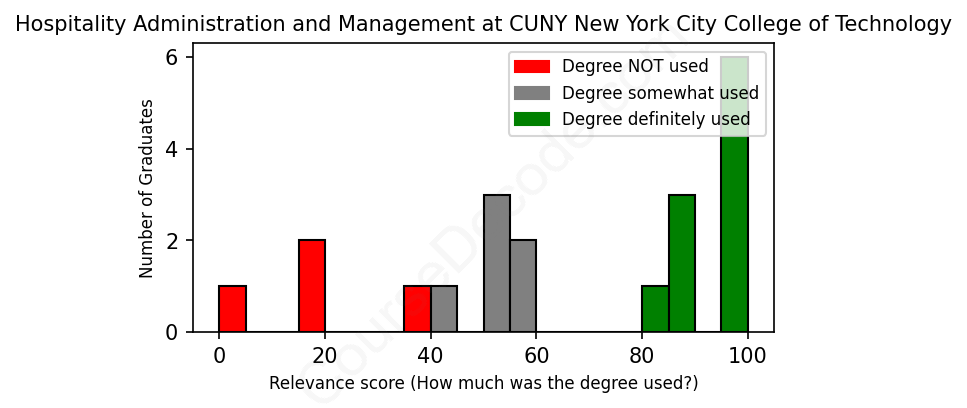
First, some facts. Of the Hospitality Administration and Management graduates from CUNY New York City College of Technology we've analyzed , here's how many have used (or NOT used) their degree in their career:

These are estimates based on AI analysis of 20 LinkedIn profiles (see below).
The verdict? Slightly below average. Overall, with an average relevance score of 66%, Hospitality Administration and Management graduates from CUNY New York City College of Technology have a slightly lower likelihood (-1%) of finding work in this field compared to the average graduate across all fields:
And for comparison, here's the chart for all profiles we've looked at across all degrees.
Also, after graduating, only 15% of these graduates have pursued further education other than another Bachelor's degree (such as a Masters degree or other), compared to the average across all profiles of 35%. This suggests a Bachelors degree is enough for most Hospitality Administration and Management graduates, and it's normal to look for work straight after graduation.
See the details:
|
Relevance score: 85% We think this person has gone into a career highly relevant to their degree. We think this person has gone into a career highly relevant to their degree.
DEGREE INFOGraduated in 2018 from CUNY New York City College of Technology with a Bachelor's degree in Hospitality Administration and Management. No other secondary education since. JOB HISTORY SINCE GRADUATIONNight Auditor Holiday Inn Express Apr 2018 - Present Front Desk Representative  Holiday Inn Express Mar 2018 - Present Guest Service Agent  Goldman Sachs Aug 2019 - Present ABOUTI've been working and studying in the hospitality industry for 6 years now. I achieved many goals but i am always excited that i get the opportunity to continue to learn and grow within this amazing industry. |
The top 10 most common jobs done by the graduates we've analyzed (ranked most common to least) are:
When analyzing the job paths of graduates from the Hospitality Administration and Management program at CUNY New York City College of Technology, a few common roles emerge. Many individuals have taken on positions in guest services, food and beverage management, and housekeeping, which are closely tied to the skills taught in their degree. Roles like Guest Service Agent, Housekeeping Manager, and various food service positions like Bartender or Food Service Supervisor are prominent. These jobs reflect a focus on customer interaction, operations management, and delivering service excellence, which are foundational in hospitality.
However, it's clear that not all jobs taken by these graduates are directly relevant to their degree. While some roles such as Guest Relations Manager and Housekeeping Manager leverage comprehensive hospitality principles, others, like HR positions, business analyst roles, and various administrative jobs, might only use transferable skills without demanding specific expertise in hospitality management. Overall, while many graduates find their way into hospitality-related jobs that utilize their education, there are also several that have ventured into fields where their degree’s relevance is either minimal or tangential, indicating a mixture of direct and indirect career paths following their studies.
Here is a visual representation of the most common words in job titles for Hospitality Administration and Management graduates (this is across all Hospitality Administration and Management graduates we've analyzed, not just those who went to CUNY New York City College of Technology):

When it comes to graduates from the CUNY New York City College of Technology with a degree in Hospitality Administration and Management, it looks like they generally kick off their careers in entry-level positions related to customer service or operations in the hospitality sector. For many of them, the first job after graduation often involves roles like guest services or food and beverage positions—think front desk jobs or bartending. As they gain experience over the first few years, they tend to progress within their companies or even transition into new organizations while climbing the career ladder. For example, many have moved from roles like assistant managers to higher positions like housekeepers or managers over a span of several years.
Fast forward five to ten years, and you’ll see a good number of these graduates have made quite a name for themselves in the hospitality industry. Some have taken on leadership roles within hotel chains, managing departments or overseeing operations, while others have branched out into tech or business analyst positions within travel companies. It seems like many graduates have successfully leveraged their education and early career experiences into stable and often impressive careers related to hospitality and management. So, if you’re considering this field, it looks like there are plenty of opportunities for growth and advancement ahead!
Getting a Bachelor’s degree in Hospitality Administration and Management at CUNY New York City College of Technology, or really anywhere, can be a mix of challenges and fun. It’s not the hardest degree out there, but you’ll definitely have to put in some serious effort. The coursework usually involves a lot of group projects, hands-on experiences, and sometimes even dealing with real-world situations, which can be super engaging but also stressful. If you enjoy being around people and have a passion for the hospitality industry, you'll likely find it more enjoyable than difficult. You just need to stay organized and be ready to juggle assignments, presentations, and maybe even some internships along the way. Overall, it's manageable, especially if you keep your focus and don't procrastinate too much!
Most commonly, in the LinkedIn profiles we've looked at, it takes people 4 years to finish a Bachelor degree in Hospitality Administration and Management.
Looking at the career paths of these CUNY New York City College of Technology grads, it seems like some are making decent money, while others are still climbing the ladder. For instance, a few people who started in entry-level roles like bartenders or guest service agents have progressed to management positions at big-name hotels and companies, which often come with a nice paycheck. On the flip side, some folks are still in basic service jobs or have switched around a lot without clear upward mobility, suggesting they might not be raking in the big bucks just yet. Overall, it looks like with experience and strategic moves, many of these grads have the potential to pull in solid salaries, especially those in managerial roles, but some are definitely still working their way up.
Here is a visual representation of the most common words seen in the "about" section of LinkedIn profiles who have a Bachelor degree in Hospitality Administration and Management (this is across all Hospitality Administration and Management graduates we've analyzed, not just those who went to CUNY New York City College of Technology). This may or may not be useful:

Here are all colleges offering a Bachelor degree in Hospitality Administration and Management (ordered by the average relevance score of their Hospitality Administration and Management graduates, best to worst) where we have analyzed at least 10 of their graduates:
| College | Score | Count |
|---|---|---|
 Kendall College Kendall College
|
81 | 12 |
 University of Phoenix University of Phoenix
|
80 | 13 |
 Penn State University Penn State University
|
78 | 16 |
 University of South Carolina University of South Carolina
|
75 | 11 |
 University of North Texas University of North Texas
|
73 | 26 |
 Indiana University of Pennsylvania Indiana University of Pennsylvania
|
71 | 12 |
 University of Central Florida University of Central Florida
|
69 | 40 |
 University of Nevada-Las Vegas University of Nevada-Las Vegas
|
67 | 64 |
 CUNY New York City College of Technology CUNY New York City College of Technology
|
66 | 20 |
 Florida International University Florida International University
|
64 | 57 |
 California State Polytechnic University-Pomona California State Polytechnic University-Pomona
|
64 | 31 |
 University of Central Florida Rosen College of Hospitality Management University of Central Florida Rosen College of Hospitality Management
|
63 | 37 |
 Florida State University Florida State University
|
62 | 29 |
 Missouri State University Missouri State University
|
62 | 15 |
 James Madison University James Madison University
|
60 | 16 |
 Georgia State University Georgia State University
|
58 | 10 |
 State University of New York College at Buffalo State University of New York College at Buffalo
|
58 | 10 |
 The Ohio State University The Ohio State University
|
56 | 14 |
 Johnson & Wales University Johnson & Wales University
|
53 | 14 |
 Monroe College Monroe College
|
53 | 13 |
 East Carolina University East Carolina University
|
51 | 13 |
 University of Missouri-Columbia University of Missouri-Columbia
|
49 | 12 |
 University of South Carolina-Columbia University of South Carolina-Columbia
|
44 | 10 |
 University of Mississippi University of Mississippi
|
43 | 10 |